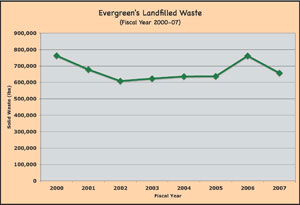The Evergreen State College, WA Commitment to Zero Waste
Type: Policy
Status: Adopted in 2007
Source File: http://www.evergreen.edu/sustainability/zerowaste.htm
Description:
Zero Waste
The Evergreen State College is committed to zero waste by 2020 as specified in our 2007 Updated Strategic Plan and in our Campus Master Plan. The road to zero waste will not be easy – but everyone in our community agrees that the goal of significantly reducing our landfill waste is an effort worth pursuing.
Currently, the facilities department trucks Evergreen’s solid waste to the Hawk’s Prairie Transfer Station in Lacey, WA. From Hawk’s Prairie, it is trucked to Centralia, WA where it is loaded onto a train destined for Goldendale, WA. From Goldendale, Evergreen’s landfill waste is trucked to the Roosevelt Landfill in Klickitat County, WA. Solid Waste Line Chart
Last year, The Evergreen State College sent nearly 700,000 lbs of solid waste to the landfill. Once at the Roosevelt Landfill, it will take several decades for our solid waste to decompose completely. As it does, it releases methane – a very potent greenhouse gas. Through the combination of transportation and decomposition, Evergreen’s solid waste is responsible for about 50 tons of greenhouse gas emissions every year.
On May 22nd, after sorting garbage cans from Red Square, the Greenery, Seminar II, and the Sem II Cafe, the campus waste audit found only 12.5% "garbage." Read full article... (PDF)
More Information on Moving Toward Zero Waste
PODs Project
Each spring, approximately 900 Evergreen students move out of their dorms leaving perfectly reusable items behind. Historically, these items would be destined for the landfill. That began to change in 2004 with the creation of a sustainable “check-out.” Last year, the PODs Project (as it is now called) recovered enough clothing to fill 35 industrial-size laundry machines, 100 pounds of nonperishable food, 200 pounds of cleaning and hygienic supplies and more than 40 pieces of furniture. These items were then delivered to about 10 nonprofit charitable groups in South Sound, including SafePlace, Camp Quixote, Books for Prisoners, Thurston County Food Bank, Rosie’s Place and Habitat for Humanity. Read the article in the Olympian about the PODs Project.
Free Store
In January 2008, the Free Store opened in the Housing Community Center. Items often donated and available for free include clothing, books, CDs, kitchen utensils, shoes and many other items. Everyone in the Evergreen community is familiar with the three R’s (reduce, reuse, recycle) but “reuse” is frequently the one least utilized. The Free Store is helping to change that. Read the article in the Olympian about the Free Store.
"Moving Toward Zero Waste" Student Affairs Annual Pancake Breakfast
The Student Affairs Sustainability Committee, headed by Sharon Goodman, Director of Residential and Dining Services, was asked to take part in the planning of the Annual Pancake Breakfast held on April 17, 2008. When the group began to discuss options for a theme of the event they chose to explore the idea of Zero Waste Dining. The Sustainability Intern with Dining Services, Halli Winstead, and the Sustainability Intern with Residential and Dining Services, Katie Taylor, explored the concept of Zero Waste by meeting with John Pumilio, the Director of Sustainability. Katie and Halli also met with Jay Cortez, Director of Aramark Catering, to identify sources of waste and to discuss creative ways to reduce that waste in as many areas as possible. During that meeting Catering agreed to use China for the event at no cost, Jay also agreed that labor would be at no cost to the event. Katie Taylor worked with conference services to decorate the event room with Sustainability Tips, plant starts and auction materials. Halli coordinated with the Organic Farm to provide compost service for the event.
These efforts resulted in:
- Increased compost and recycling; significantly reduced landfill waste!
- The use of a hot box to hold the pancakes and sausages (instead of sterno or electric sterno chaufer dishes). In order to keep the food hot for participants the catering crew frequently rotated small batches in and out of the hot box.
- The use of China dishes instead of disposable ones.
- The use of newsprint table covers instead of cloth table covers that doubled as medium to write sustainability tips.
- Bulk sugar, ketchup, syrup, cream, half and half, and soy milk rather than small individually packaged items.
During the event:
- Katie Taylor, Halli Winstead and Sharon Goodman each introduced the event. All three talked about different aspects of the planning and coordination of "Moving Toward Zero Waste Dining."
- John Pumilio talked about The Evergreen State College waste stream, the importance of reducing landfill waste and the campus goal to be Zero Waste by 2020.
Post breakfast feedback:
- Numerous catering clients have requested Zero Waste Dining Methods for their catered events.
- Les Purce, President of The Evergreen State College, unofficially requested that all his catered events be done in the "Moving Toward Zero Waste Dining" model.
- Faculty expressed interest in this catering model for future events.
- Numerous event participants commented on job well done!
